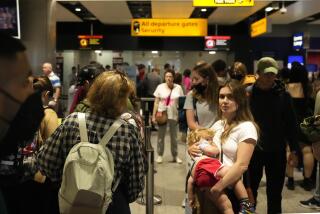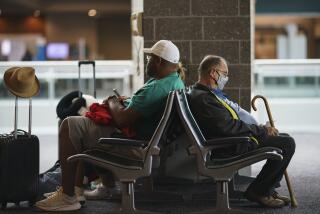Jet-lagged from that long summer flight? Tips on reducing the fog and fatigue

Jet lag, as common as the common cold, abounds this time of year as travelers take long-haul summer vacations. And like a tough-to-shake cold, it often produces crankiness, insomnia and a foggy, cotton-headed funk.
Welcome to jet-lag season.
“I’m a zombie the first four or five days I travel,” said Chris Baiz of Los Angeles. “Tried everything. I wake up at 1 or 2 a.m. and then lie there awake.”
“After returning to L.A. from a New York trip, sleeping through the night and awakening the next day, I found myself bonking around the house like a misguided pinball wizard, dopey and loopy,” said Kathryn Rueby of Torrance.
In the case of one recent traveler, jet lag can put you in a mental haze that can lead to agonizing disruptions.
“After arriving in Ireland, I fell asleep every two to three hours in the van,” recalled Jory Schulman of Los Angeles. “I left my backpack at the dry cleaners in Kinsale. Luckily, it was left untouched, as my passport was inside.”
What’s the answer? Medical professionals and avid long-distance travelers recommend heavy hydration and advocate quickly adopting the meal times and sleep patterns of your destination.
“Rule No. 1: Stay on local time,” said Dr. Robert Winters of Santa Monica, who deals with long-distance travelers as medical director of Westside Travel and Immunizations Inc. “[Experts] say to minimize alcohol, but one drink can help you relax.
“Eye shades and earplugs are key while flying,” he added.
Winters said blackout masks and good ear covering can ensure travelers get rest during full and noisy summer flights.
Instead of watching movies or reading, Winters favors sleeping on planes when traveling himself, particularly on overnight flights. “I might take an Ambien or melatonin. I don’t do both.”
Winters recommended 3 to 5 milligrams of melatonin, an over-the-counter supplement that triggers sleep.
When it comes to waking up, sleep experts at the Mayo Clinic recommend light therapy — either natural sunlight or a lamp — when you’re traveling east. Conversely, experts there urge westbound travelers to draw the blinds in a time zone where the sun is staying up longer than you are accustomed.
Body clocks are tricky timepieces, and tough to reset quickly, experts said. During jet lag, brain cells in two parts of the brain fall out of sync. The health journal Medical News Today said the older the traveler, the worse the symptoms and the longer it takes to recover.
Among veteran travelers, the conventional wisdom is that every time zone crossed requires a day of recovery. For example, a nine-hour time change on a trip from Rome would require nine days to rebound once you return home.
The issue is significant enough that aircraft makers are adjusting cabin pressures to help offset symptoms. For instance, Boeing’s 787 is now pressurized at 6,000 feet, 2,000 feet lower than most other aircraft. Altitude chamber tests show that the body absorbs more oxygen into the blood this way, and passengers experience fewer headaches and less fatigue.
Though there is no sure cure for jet lag, prevention can make a difference in the severity of symptoms. Frequent fliers cite the benefits of lots and lots of water.
“I drink water the minute I get off the plane,” said Mary Garripoli of Los Angeles. “For the first 24 hours, just water, no ice tea, no wine. When I come home, it’s the same thing.”
“I was a flight attendant for many years,” said Patricia Dotzler of Los Angeles. “I found that drinking a lot of water starting three days before departure, plus during and after flights … then taking a good walk after arriving at the hotel helped a lot.”
Like Winters, travel blogger Suzanne Stavert recommended adjusting to local schedules when you get to your destination.
“The absolute best way to get over jet lag is to get on local time immediately,” Stavert said. “Do not nap. Stay hydrated, and go to sleep around 9 p.m. the first night of the trip and wake up at a normal local time. It has worked for me traveling to any time zone all over the world.”
“My dad, who worked in travel for 40 years, gave me one tip: Plan to get in to your destination in the afternoon and force yourself to stay up until a relatively normal early bedtime in the country where you’re staying,” said financial journalist Kathy Kristof of La Cañada Flintridge.
And more sleep tips from a parent on the front lines:
“Don’t let your already grumpy teens sleep all day when you get to Europe; make them adjust,” said Joshua Kreinberg of Pasadena, who vacationed in France with his family in early August. “They are going to be grumpy anyway because they are teens on a family vacation.”
Jet lag tip sheet
Medical experts and frequent travelers suggest these steps for reducing jet lag:
- Hydrate before, during and after trips
- Use a blackout mask and earplugs to sleep during flights.
- If possible, arrive at your destination in the afternoon.
- Adapt to local time as soon as possible.
- Rely on exercise and sunlight to help the body reset its rhythms.
- Use melatonin or other sleep aids to help the body wind down at night. Check with your doctor about possible side effects and the danger of mixing them with other prescriptions.
- Stay up to see the sunset to get accustomed to the new time zone.
- Limit alcohol intake, especially on arrival.
- Avoid caffeine after midday.
More to Read
Sign up for The Wild
We’ll help you find the best places to hike, bike and run, as well as the perfect silent spots for meditation and yoga.
You may occasionally receive promotional content from the Los Angeles Times.







